Unit 4 Weather and our life单元提升测试题(含答案)
文档属性
| 名称 | Unit 4 Weather and our life单元提升测试题(含答案) |
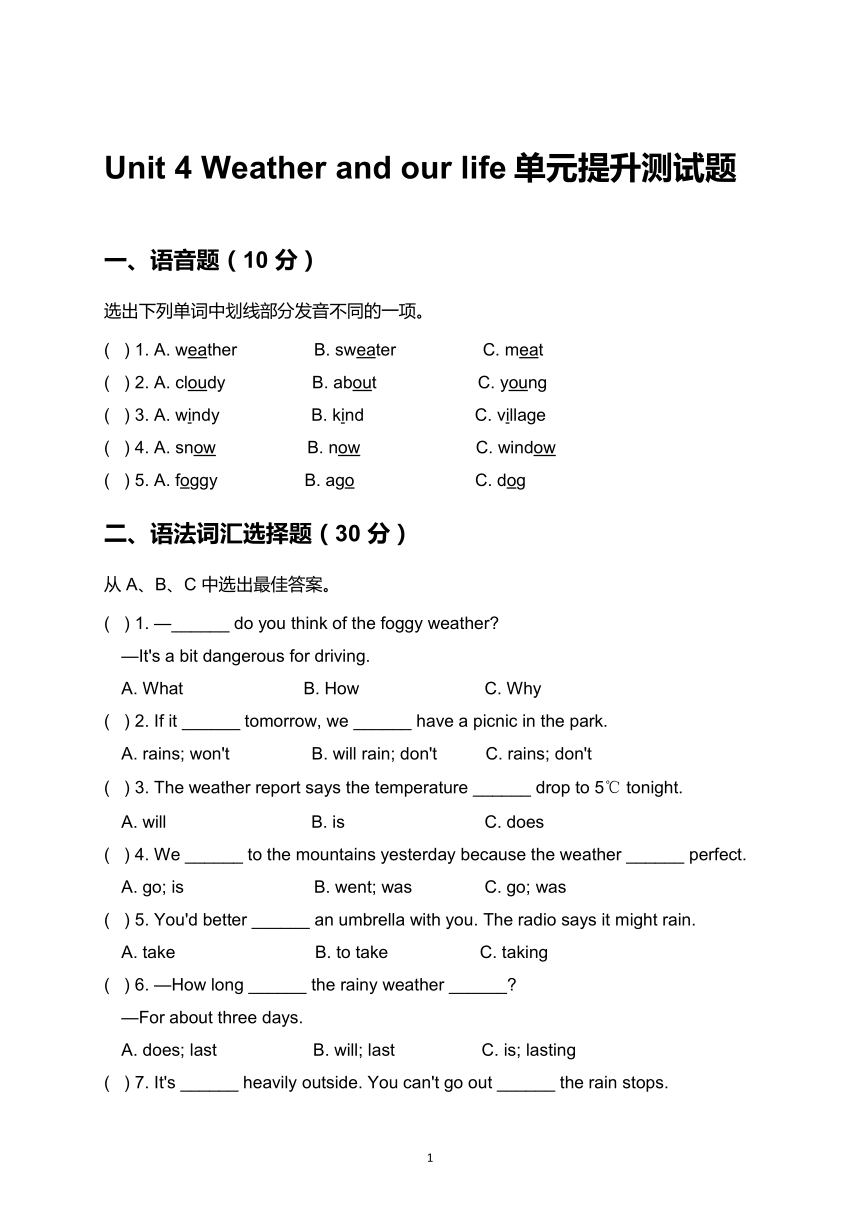
|
|
| 格式 | docx | ||
| 文件大小 | 26.3KB | ||
| 资源类型 | 试卷 | ||
| 版本资源 | 鲁科版(五四制) | ||
| 科目 | 英语 | ||
| 更新时间 | 2025-08-04 00:00:00 | ||
图片预览

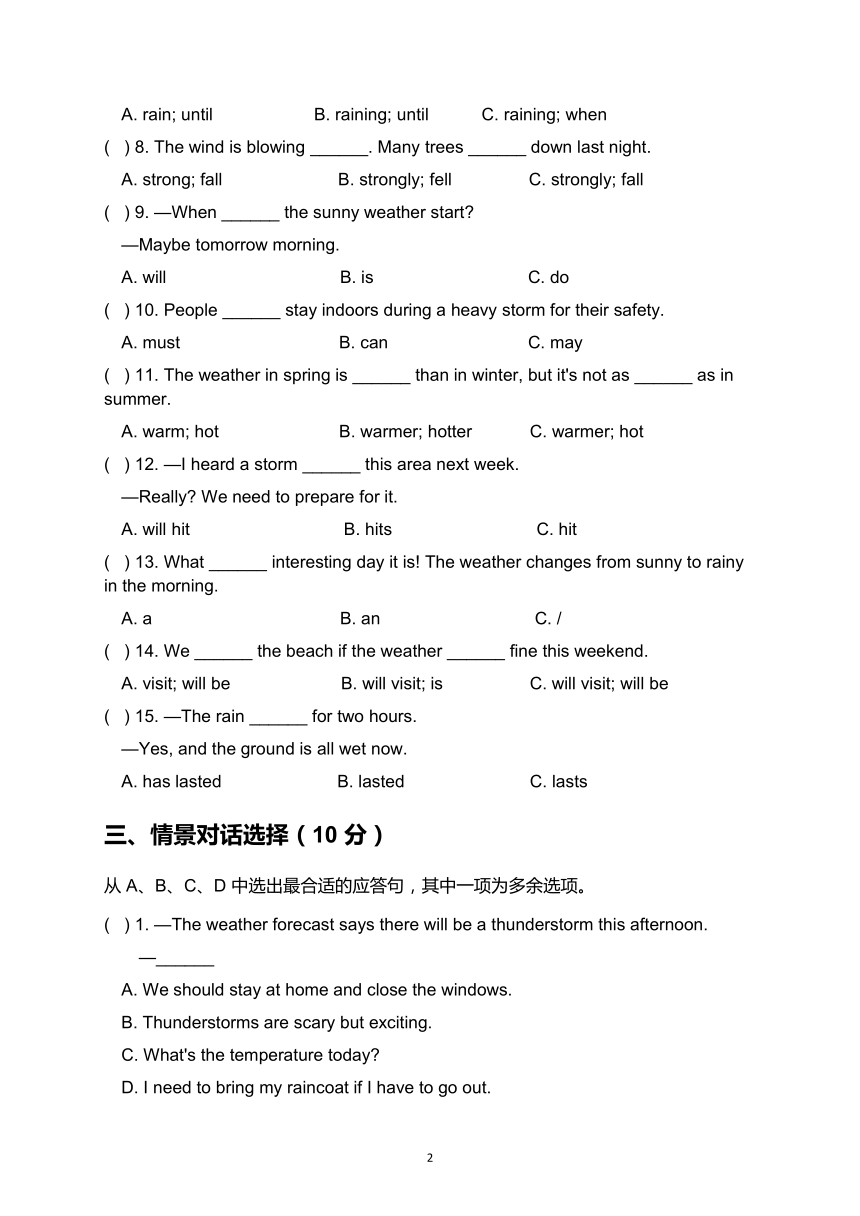
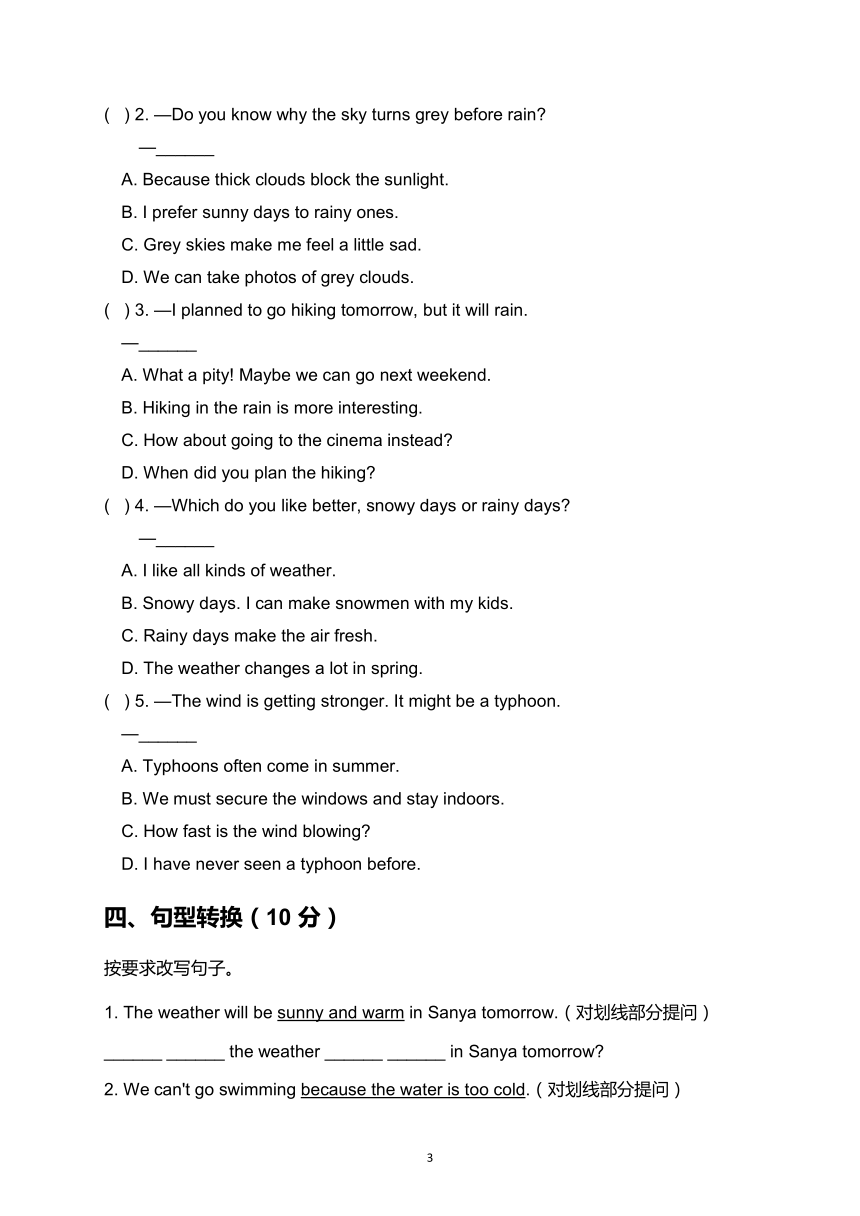
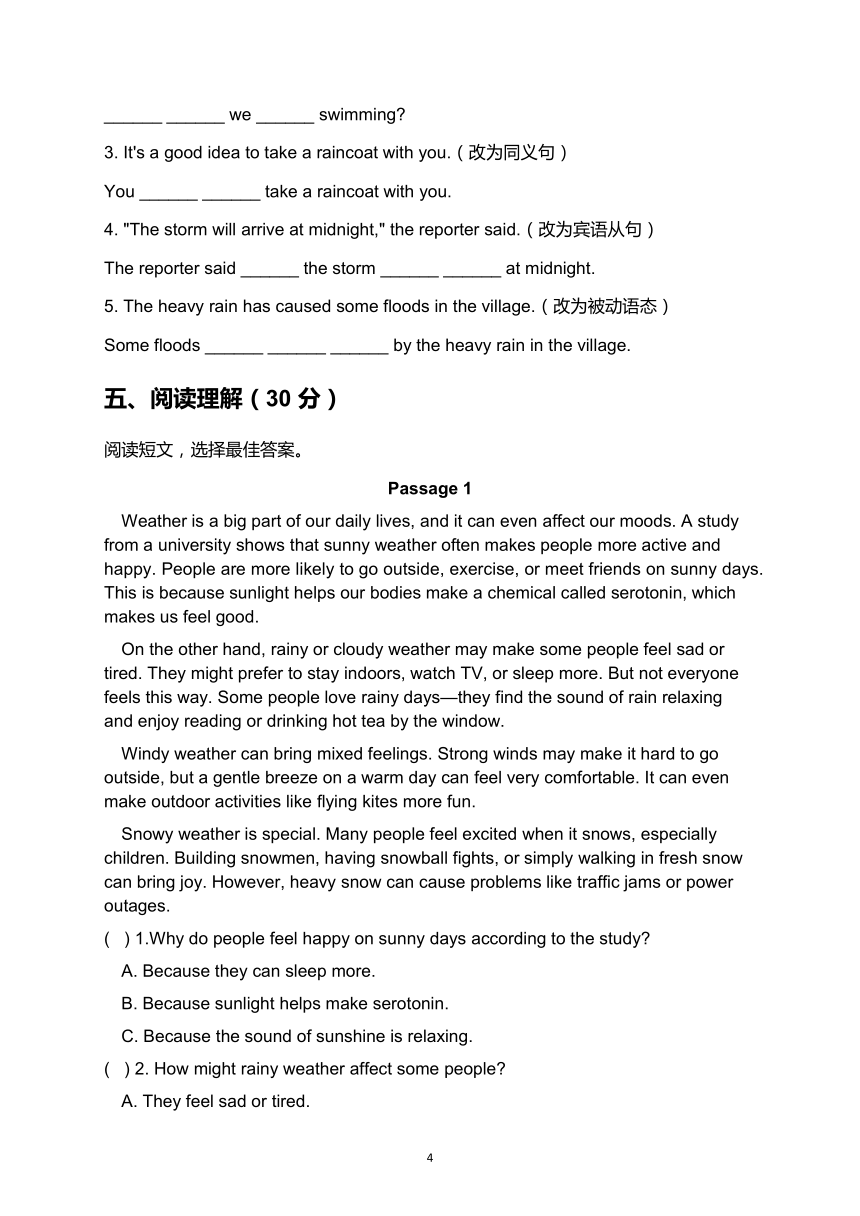
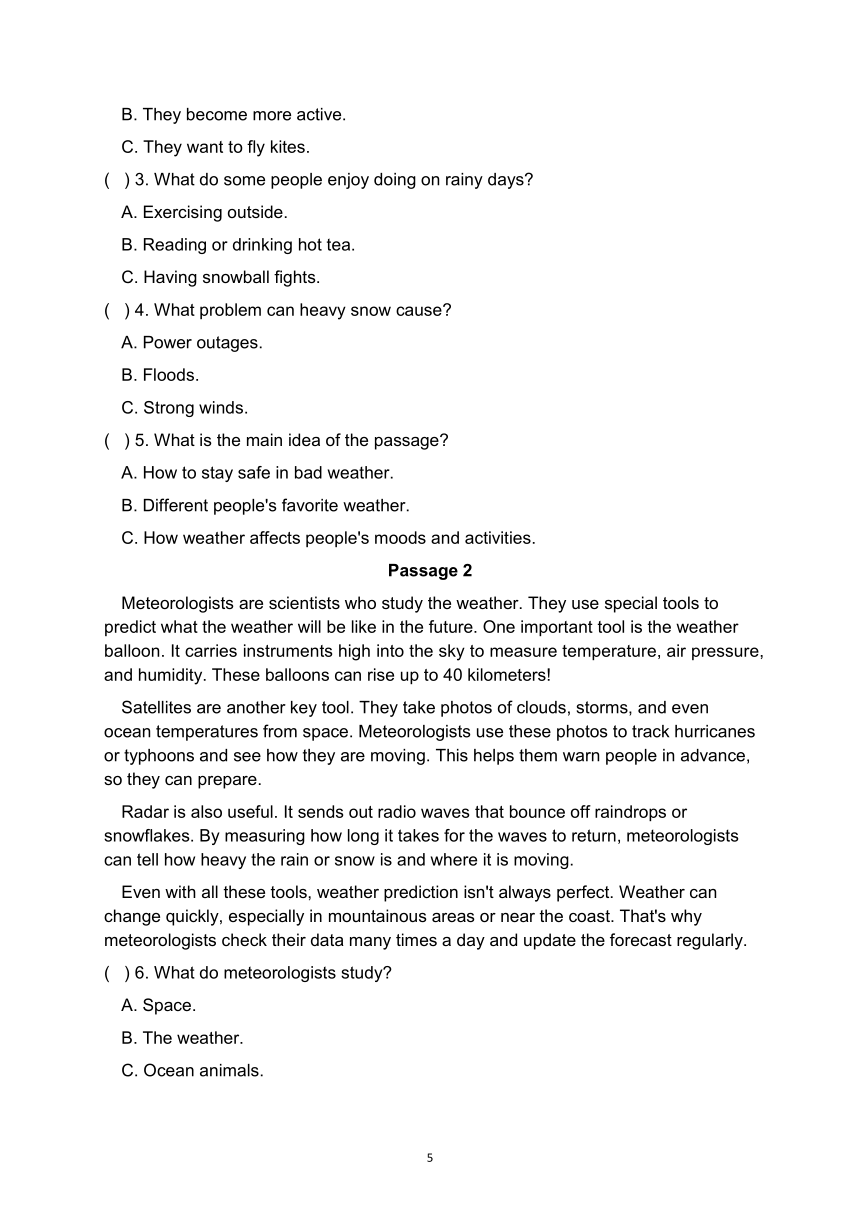
文档简介
Unit 4 Weather and our life单元提升测试题
一、语音题(10 分)
选出下列单词中划线部分发音不同的一项。
( ) 1. A. weather B. sweater C. meat
( ) 2. A. cloudy B. about C. young
( ) 3. A. windy B. kind C. village
( ) 4. A. snow B. now C. window
( ) 5. A. foggy B. ago C. dog
二、语法词汇选择题(30 分)
从 A、B、C 中选出最佳答案。
( ) 1. —______ do you think of the foggy weather
—It's a bit dangerous for driving.
A. What B. How C. Why
( ) 2. If it ______ tomorrow, we ______ have a picnic in the park.
A. rains; won't B. will rain; don't C. rains; don't
( ) 3. The weather report says the temperature ______ drop to 5℃ tonight.
A. will B. is C. does
( ) 4. We ______ to the mountains yesterday because the weather ______ perfect.
A. go; is B. went; was C. go; was
( ) 5. You'd better ______ an umbrella with you. The radio says it might rain.
A. take B. to take C. taking
( ) 6. —How long ______ the rainy weather ______
—For about three days.
A. does; last B. will; last C. is; lasting
( ) 7. It's ______ heavily outside. You can't go out ______ the rain stops.
A. rain; until B. raining; until C. raining; when
( ) 8. The wind is blowing ______. Many trees ______ down last night.
A. strong; fall B. strongly; fell C. strongly; fall
( ) 9. —When ______ the sunny weather start
—Maybe tomorrow morning.
A. will B. is C. do
( ) 10. People ______ stay indoors during a heavy storm for their safety.
A. must B. can C. may
( ) 11. The weather in spring is ______ than in winter, but it's not as ______ as in summer.
A. warm; hot B. warmer; hotter C. warmer; hot
( ) 12. —I heard a storm ______ this area next week.
—Really We need to prepare for it.
A. will hit B. hits C. hit
( ) 13. What ______ interesting day it is! The weather changes from sunny to rainy in the morning.
A. a B. an C. /
( ) 14. We ______ the beach if the weather ______ fine this weekend.
A. visit; will be B. will visit; is C. will visit; will be
( ) 15. —The rain ______ for two hours.
—Yes, and the ground is all wet now.
A. has lasted B. lasted C. lasts
三、情景对话选择(10 分)
从 A、B、C、D 中选出最合适的应答句,其中一项为多余选项。
( ) 1. —The weather forecast says there will be a thunderstorm this afternoon.
—______
A. We should stay at home and close the windows.
B. Thunderstorms are scary but exciting.
C. What's the temperature today
D. I need to bring my raincoat if I have to go out.
( ) 2. —Do you know why the sky turns grey before rain
—______
A. Because thick clouds block the sunlight.
B. I prefer sunny days to rainy ones.
C. Grey skies make me feel a little sad.
D. We can take photos of grey clouds.
( ) 3. —I planned to go hiking tomorrow, but it will rain.
—______
A. What a pity! Maybe we can go next weekend.
B. Hiking in the rain is more interesting.
C. How about going to the cinema instead
D. When did you plan the hiking
( ) 4. —Which do you like better, snowy days or rainy days
—______
A. I like all kinds of weather.
B. Snowy days. I can make snowmen with my kids.
C. Rainy days make the air fresh.
D. The weather changes a lot in spring.
( ) 5. —The wind is getting stronger. It might be a typhoon.
—______
A. Typhoons often come in summer.
B. We must secure the windows and stay indoors.
C. How fast is the wind blowing
D. I have never seen a typhoon before.
四、句型转换(10 分)
按要求改写句子。
The weather will be sunny and warm in Sanya tomorrow.(对划线部分提问)
______ ______ the weather ______ ______ in Sanya tomorrow
We can't go swimming because the water is too cold.(对划线部分提问)
______ ______ we ______ swimming
It's a good idea to take a raincoat with you.(改为同义句)
You ______ ______ take a raincoat with you.
"The storm will arrive at midnight," the reporter said.(改为宾语从句)
The reporter said ______ the storm ______ ______ at midnight.
The heavy rain has caused some floods in the village.(改为被动语态)
Some floods ______ ______ ______ by the heavy rain in the village.
五、阅读理解(30 分)
阅读短文,选择最佳答案。
Passage 1
Weather is a big part of our daily lives, and it can even affect our moods. A study from a university shows that sunny weather often makes people more active and happy. People are more likely to go outside, exercise, or meet friends on sunny days. This is because sunlight helps our bodies make a chemical called serotonin, which makes us feel good.
On the other hand, rainy or cloudy weather may make some people feel sad or tired. They might prefer to stay indoors, watch TV, or sleep more. But not everyone feels this way. Some people love rainy days—they find the sound of rain relaxing and enjoy reading or drinking hot tea by the window.
Windy weather can bring mixed feelings. Strong winds may make it hard to go outside, but a gentle breeze on a warm day can feel very comfortable. It can even make outdoor activities like flying kites more fun.
Snowy weather is special. Many people feel excited when it snows, especially children. Building snowmen, having snowball fights, or simply walking in fresh snow can bring joy. However, heavy snow can cause problems like traffic jams or power outages.
( ) 1.Why do people feel happy on sunny days according to the study
A. Because they can sleep more.
B. Because sunlight helps make serotonin.
C. Because the sound of sunshine is relaxing.
( ) 2. How might rainy weather affect some people
A. They feel sad or tired.
B. They become more active.
C. They want to fly kites.
( ) 3. What do some people enjoy doing on rainy days
A. Exercising outside.
B. Reading or drinking hot tea.
C. Having snowball fights.
( ) 4. What problem can heavy snow cause
A. Power outages.
B. Floods.
C. Strong winds.
( ) 5. What is the main idea of the passage
A. How to stay safe in bad weather.
B. Different people's favorite weather.
C. How weather affects people's moods and activities.
Passage 2
Meteorologists are scientists who study the weather. They use special tools to predict what the weather will be like in the future. One important tool is the weather balloon. It carries instruments high into the sky to measure temperature, air pressure, and humidity. These balloons can rise up to 40 kilometers!
Satellites are another key tool. They take photos of clouds, storms, and even ocean temperatures from space. Meteorologists use these photos to track hurricanes or typhoons and see how they are moving. This helps them warn people in advance, so they can prepare.
Radar is also useful. It sends out radio waves that bounce off raindrops or snowflakes. By measuring how long it takes for the waves to return, meteorologists can tell how heavy the rain or snow is and where it is moving.
Even with all these tools, weather prediction isn't always perfect. Weather can change quickly, especially in mountainous areas or near the coast. That's why meteorologists check their data many times a day and update the forecast regularly.
( ) 6. What do meteorologists study
A. Space.
B. The weather.
C. Ocean animals.
( ) 7. What does a weather balloon measure
A. Radio waves.
B. Traffic jams.
C. Temperature and air pressure.
( ) 8. How do satellites help predict the weather
A. They take photos of clouds and storms.
B. They bounce off raindrops.
C. They carry instruments into the sky.
( ) 9. Why isn't weather prediction always perfect
A. Because meteorologists don't use tools.
B. Because weather can change quickly.
C. Because satellites are too slow.
( ) 10. Why do meteorologists update the forecast regularly
A. To cause traffic jams.
B. To make the weather change.
C. Because weather can change quickly.
Passage 3
Different cultures have unique ways of dealing with different weather. In countries with heavy rain, like India during the monsoon season, people have special traditions. They often celebrate the rain with dances and music, as it helps crops grow. Many families also prepare special foods to enjoy while staying indoors during heavy downpours.
In places with cold, snowy winters, such as Norway, people have adapted well. They use special tires on their cars to drive on ice and snow. Children learn to ski at a young age, and skiing becomes a popular family activity. Many homes have fireplaces to stay warm, and people enjoy hot drinks like gl gg, a spiced wine.
In desert areas where it's hot and dry, like parts of Australia, people protect themselves from the strong sun. They wear hats, sunglasses, and light-colored clothes. They also often take breaks during the hottest part of the day and drink plenty of water to stay cool. Some communities even have special water-saving rules to deal with limited rainfall.
In windy regions, such as Scotland, wind energy is widely used. Many wind farms generate electricity, which is both clean and useful. People there are used to windy days and often enjoy outdoor activities like windsurfing when the wind is strong enough.
( ) 11. How do people in India celebrate during the monsoon season
A. They have dances and music.
B. They go skiing.
C. They build wind farms.
( ) 12. What do Norwegian children learn at a young age
A. To dance in the rain.
B. To ski.
C. To save water.
( ) 13. Why do people in Australian deserts wear light-colored clothes
A. To stay warm.
B. To protect from the strong sun.
C. To dance more easily.
( ) 14. What do people in Scotland use wind energy for
A. To heat homes.
B. To generate electricity.
C. To water crops.
( ) 15. What is the passage mainly about
A. How different cultures deal with weather.
B. The worst weather in different countries.
C. How to predict weather in different places.
六、书面表达(10 分)
以 “Weather and Our Plans” 为题,写一篇短文,至少 6 句。
要求:1. 描述不同天气对计划的影响;2. 举例说明如何根据天气调整计划;3. 表达对天气与计划关系的看法。
参考答案及解析
一、语音题(10 分)
C 解析:A. weather / we (r)/、B. sweater / swet (r)/ 中划线部分发 /e/,C. meat /mi t/ 中划线部分发 /i /,发音不同。
C 解析:A. cloudy / kla di/、B. about / ba t/ 中划线部分发 /a /,C. young /j / 中划线部分发 / /,发音不同。
B 解析:A. windy / w ndi/、C. village / v l d / 中划线部分发 / /,B. kind /ka nd/ 中划线部分发 /a /,发音不同。
B 解析:A. snow /sn /、C. window / w nd / 中划线部分发 / /,B. now /na / 中划线部分发 /a /,发音不同。
B 解析:A. foggy / f ɡi/、C. dog /d ɡ/ 中划线部分发 / /,B. ago / ɡ / 中划线部分发 / /,发音不同。
二、语法词汇选择题(30 分)
A 解析:固定句型 “What do you think of... ” 意为 “你认为…… 怎么样?”,故选 A。
A 解析:if 引导的条件状语从句遵循 “主将从现”,从句用一般现在时(rains),主句用一般将来时(won't),故选 A。
A 解析:由 tonight 可知用一般将来时,will + 动词原形表示将来,故选 A。
B 解析:由 yesterday 可知用一般过去时,go 的过去式为 went,is 的过去式为 was,故选 B。
A 解析:固定搭配 had better do sth 意为 “最好做某事”,后接动词原形,故选 A。
A 解析:由答语 “For about three days” 可知问持续时间,用一般现在时,主语为第三人称单数,助动词用 does,故选 A。
B 解析:第一空用现在进行时(raining)表示正在下雨;第二空 “not...until” 意为 “直到…… 才”,故选 B。
B 解析:第一空用副词 strongly 修饰动词 blowing;第二空由 last night 可知用一般过去时(fell),故选 B。
A 解析:由答语 “Maybe tomorrow morning” 可知用一般将来时,will + 动词原形,故选 A。
A 解析:句意 “暴雨期间人们必须待在室内以保证安全”,must 表示 “必须”,语气最强,符合语境,故选 A。
C 解析:第一空由 than 可知用比较级(warmer);第二空 “as + 原级 + as”,故选 C。
A 解析:由 next week 可知用一般将来时(will hit),故选 A。
B 解析:感叹句结构 “What+a/an + 形容词 + 可数名词单数”,interesting 以元音音素开头,用 an,故选 B。
B 解析:if 引导的条件状语从句 “主将从现”,主句用一般将来时(will visit),从句用一般现在时(is),故选 B。
A 解析:由 “for two hours” 可知用现在完成时(has lasted),表示动作持续到现在,故选 A。
三、情景对话选择(10 分)
A 解析:对方提到有雷暴,应答应建议安全措施,A “我们应该待在家里并关窗” 最合理,故选 A。
A 解析:问句询问天空变灰的原因,A “因为厚云挡住了阳光” 直接回答原因,故选 A。
C 解析:对方计划徒步但遇雨天,C “去看电影怎么样” 提出替代方案,符合语境,故选 C。
B 解析:问句选择 “雪天还是雨天”,B 直接回答并说明原因,故选 B。
B 解析:对方提到可能有台风,B “我们必须固定窗户并待在室内” 是合理的应对措施,故选 B。
四、句型转换(10 分)
What will; be like 解析:对天气提问用 “What will the weather be like... ”。
Why can't; go 解析:对原因提问用 why,情态动词 can't 提前。
had better 解析:“It's a good idea to do sth” 同义句为 “You had better do sth”。
that; would arrive 解析:宾语从句中,主句为一般过去时,从句用过去将来时(would arrive),that 可省略。
have been caused 解析:现在完成时的被动语态结构 “have/has been + 过去分词”,主语为复数,用 have。
五、阅读理解(30 分)
Passage 1
B 解析:由 “sunlight helps our bodies make a chemical called serotonin, which makes us feel good” 可知,选 B。
A 解析:由 “rainy or cloudy weather may make some people feel sad or tired” 可知,选 A。
B 解析:由 “some people love rainy days... enjoy reading or drinking hot tea” 可知,选 B。
A 解析:由 “heavy snow can cause problems like... power outages” 可知,选 A。
C 解析:全文主要讲天气对人的情绪和活动的影响,选 C。
Passage 2
6. B 解析:由 “Meteorologists are scientists who study the weather” 可知,选 B。
7. C 解析:由 “weather balloon... to measure temperature, air pressure, and humidity” 可知,选 C。
8. A 解析:由 “Satellites... take photos of clouds, storms...” 可知,选 A。
9. B 解析:由 “Weather can change quickly... prediction isn't always perfect” 可知,选 B。
10. C 解析:由 “weather can change quickly... update the forecast regularly” 可知,选 C。
Passage 3
11. A 解析:由 “India during the monsoon season... celebrate the rain with dances and music” 可知,选 A。
12. B 解析:由 “Norway... Children learn to ski at a young age” 可知,选 B。
13. B 解析:由 “Australian deserts... wear... light-colored clothes” 是为了 “protect themselves from the strong sun”,选 B。
14. B 解析:由 “Scotland... wind farms generate electricity” 可知,选 B。
15. A 解析:全文讲不同文化应对天气的独特方式,选 A。
六、书面表达(10 分)
参考范文
Weather and Our Plans
Weather has a big influence on our daily plans. On sunny days, we often plan outdoor activities like picnics or hiking. But if it rains, we may have to stay indoors and read books or watch movies instead.
Last weekend, my family planned to visit the zoo, but the weather forecast said it would rain. So we changed our plan to visit the museum, which was also interesting. When there is a storm, we must cancel outdoor plans to stay safe.
In my opinion, weather teaches us to be flexible. Even if plans change because of weather, we can always find fun things to do. It's important to check the weather forecast before making plans.
一、语音题(10 分)
选出下列单词中划线部分发音不同的一项。
( ) 1. A. weather B. sweater C. meat
( ) 2. A. cloudy B. about C. young
( ) 3. A. windy B. kind C. village
( ) 4. A. snow B. now C. window
( ) 5. A. foggy B. ago C. dog
二、语法词汇选择题(30 分)
从 A、B、C 中选出最佳答案。
( ) 1. —______ do you think of the foggy weather
—It's a bit dangerous for driving.
A. What B. How C. Why
( ) 2. If it ______ tomorrow, we ______ have a picnic in the park.
A. rains; won't B. will rain; don't C. rains; don't
( ) 3. The weather report says the temperature ______ drop to 5℃ tonight.
A. will B. is C. does
( ) 4. We ______ to the mountains yesterday because the weather ______ perfect.
A. go; is B. went; was C. go; was
( ) 5. You'd better ______ an umbrella with you. The radio says it might rain.
A. take B. to take C. taking
( ) 6. —How long ______ the rainy weather ______
—For about three days.
A. does; last B. will; last C. is; lasting
( ) 7. It's ______ heavily outside. You can't go out ______ the rain stops.
A. rain; until B. raining; until C. raining; when
( ) 8. The wind is blowing ______. Many trees ______ down last night.
A. strong; fall B. strongly; fell C. strongly; fall
( ) 9. —When ______ the sunny weather start
—Maybe tomorrow morning.
A. will B. is C. do
( ) 10. People ______ stay indoors during a heavy storm for their safety.
A. must B. can C. may
( ) 11. The weather in spring is ______ than in winter, but it's not as ______ as in summer.
A. warm; hot B. warmer; hotter C. warmer; hot
( ) 12. —I heard a storm ______ this area next week.
—Really We need to prepare for it.
A. will hit B. hits C. hit
( ) 13. What ______ interesting day it is! The weather changes from sunny to rainy in the morning.
A. a B. an C. /
( ) 14. We ______ the beach if the weather ______ fine this weekend.
A. visit; will be B. will visit; is C. will visit; will be
( ) 15. —The rain ______ for two hours.
—Yes, and the ground is all wet now.
A. has lasted B. lasted C. lasts
三、情景对话选择(10 分)
从 A、B、C、D 中选出最合适的应答句,其中一项为多余选项。
( ) 1. —The weather forecast says there will be a thunderstorm this afternoon.
—______
A. We should stay at home and close the windows.
B. Thunderstorms are scary but exciting.
C. What's the temperature today
D. I need to bring my raincoat if I have to go out.
( ) 2. —Do you know why the sky turns grey before rain
—______
A. Because thick clouds block the sunlight.
B. I prefer sunny days to rainy ones.
C. Grey skies make me feel a little sad.
D. We can take photos of grey clouds.
( ) 3. —I planned to go hiking tomorrow, but it will rain.
—______
A. What a pity! Maybe we can go next weekend.
B. Hiking in the rain is more interesting.
C. How about going to the cinema instead
D. When did you plan the hiking
( ) 4. —Which do you like better, snowy days or rainy days
—______
A. I like all kinds of weather.
B. Snowy days. I can make snowmen with my kids.
C. Rainy days make the air fresh.
D. The weather changes a lot in spring.
( ) 5. —The wind is getting stronger. It might be a typhoon.
—______
A. Typhoons often come in summer.
B. We must secure the windows and stay indoors.
C. How fast is the wind blowing
D. I have never seen a typhoon before.
四、句型转换(10 分)
按要求改写句子。
The weather will be sunny and warm in Sanya tomorrow.(对划线部分提问)
______ ______ the weather ______ ______ in Sanya tomorrow
We can't go swimming because the water is too cold.(对划线部分提问)
______ ______ we ______ swimming
It's a good idea to take a raincoat with you.(改为同义句)
You ______ ______ take a raincoat with you.
"The storm will arrive at midnight," the reporter said.(改为宾语从句)
The reporter said ______ the storm ______ ______ at midnight.
The heavy rain has caused some floods in the village.(改为被动语态)
Some floods ______ ______ ______ by the heavy rain in the village.
五、阅读理解(30 分)
阅读短文,选择最佳答案。
Passage 1
Weather is a big part of our daily lives, and it can even affect our moods. A study from a university shows that sunny weather often makes people more active and happy. People are more likely to go outside, exercise, or meet friends on sunny days. This is because sunlight helps our bodies make a chemical called serotonin, which makes us feel good.
On the other hand, rainy or cloudy weather may make some people feel sad or tired. They might prefer to stay indoors, watch TV, or sleep more. But not everyone feels this way. Some people love rainy days—they find the sound of rain relaxing and enjoy reading or drinking hot tea by the window.
Windy weather can bring mixed feelings. Strong winds may make it hard to go outside, but a gentle breeze on a warm day can feel very comfortable. It can even make outdoor activities like flying kites more fun.
Snowy weather is special. Many people feel excited when it snows, especially children. Building snowmen, having snowball fights, or simply walking in fresh snow can bring joy. However, heavy snow can cause problems like traffic jams or power outages.
( ) 1.Why do people feel happy on sunny days according to the study
A. Because they can sleep more.
B. Because sunlight helps make serotonin.
C. Because the sound of sunshine is relaxing.
( ) 2. How might rainy weather affect some people
A. They feel sad or tired.
B. They become more active.
C. They want to fly kites.
( ) 3. What do some people enjoy doing on rainy days
A. Exercising outside.
B. Reading or drinking hot tea.
C. Having snowball fights.
( ) 4. What problem can heavy snow cause
A. Power outages.
B. Floods.
C. Strong winds.
( ) 5. What is the main idea of the passage
A. How to stay safe in bad weather.
B. Different people's favorite weather.
C. How weather affects people's moods and activities.
Passage 2
Meteorologists are scientists who study the weather. They use special tools to predict what the weather will be like in the future. One important tool is the weather balloon. It carries instruments high into the sky to measure temperature, air pressure, and humidity. These balloons can rise up to 40 kilometers!
Satellites are another key tool. They take photos of clouds, storms, and even ocean temperatures from space. Meteorologists use these photos to track hurricanes or typhoons and see how they are moving. This helps them warn people in advance, so they can prepare.
Radar is also useful. It sends out radio waves that bounce off raindrops or snowflakes. By measuring how long it takes for the waves to return, meteorologists can tell how heavy the rain or snow is and where it is moving.
Even with all these tools, weather prediction isn't always perfect. Weather can change quickly, especially in mountainous areas or near the coast. That's why meteorologists check their data many times a day and update the forecast regularly.
( ) 6. What do meteorologists study
A. Space.
B. The weather.
C. Ocean animals.
( ) 7. What does a weather balloon measure
A. Radio waves.
B. Traffic jams.
C. Temperature and air pressure.
( ) 8. How do satellites help predict the weather
A. They take photos of clouds and storms.
B. They bounce off raindrops.
C. They carry instruments into the sky.
( ) 9. Why isn't weather prediction always perfect
A. Because meteorologists don't use tools.
B. Because weather can change quickly.
C. Because satellites are too slow.
( ) 10. Why do meteorologists update the forecast regularly
A. To cause traffic jams.
B. To make the weather change.
C. Because weather can change quickly.
Passage 3
Different cultures have unique ways of dealing with different weather. In countries with heavy rain, like India during the monsoon season, people have special traditions. They often celebrate the rain with dances and music, as it helps crops grow. Many families also prepare special foods to enjoy while staying indoors during heavy downpours.
In places with cold, snowy winters, such as Norway, people have adapted well. They use special tires on their cars to drive on ice and snow. Children learn to ski at a young age, and skiing becomes a popular family activity. Many homes have fireplaces to stay warm, and people enjoy hot drinks like gl gg, a spiced wine.
In desert areas where it's hot and dry, like parts of Australia, people protect themselves from the strong sun. They wear hats, sunglasses, and light-colored clothes. They also often take breaks during the hottest part of the day and drink plenty of water to stay cool. Some communities even have special water-saving rules to deal with limited rainfall.
In windy regions, such as Scotland, wind energy is widely used. Many wind farms generate electricity, which is both clean and useful. People there are used to windy days and often enjoy outdoor activities like windsurfing when the wind is strong enough.
( ) 11. How do people in India celebrate during the monsoon season
A. They have dances and music.
B. They go skiing.
C. They build wind farms.
( ) 12. What do Norwegian children learn at a young age
A. To dance in the rain.
B. To ski.
C. To save water.
( ) 13. Why do people in Australian deserts wear light-colored clothes
A. To stay warm.
B. To protect from the strong sun.
C. To dance more easily.
( ) 14. What do people in Scotland use wind energy for
A. To heat homes.
B. To generate electricity.
C. To water crops.
( ) 15. What is the passage mainly about
A. How different cultures deal with weather.
B. The worst weather in different countries.
C. How to predict weather in different places.
六、书面表达(10 分)
以 “Weather and Our Plans” 为题,写一篇短文,至少 6 句。
要求:1. 描述不同天气对计划的影响;2. 举例说明如何根据天气调整计划;3. 表达对天气与计划关系的看法。
参考答案及解析
一、语音题(10 分)
C 解析:A. weather / we (r)/、B. sweater / swet (r)/ 中划线部分发 /e/,C. meat /mi t/ 中划线部分发 /i /,发音不同。
C 解析:A. cloudy / kla di/、B. about / ba t/ 中划线部分发 /a /,C. young /j / 中划线部分发 / /,发音不同。
B 解析:A. windy / w ndi/、C. village / v l d / 中划线部分发 / /,B. kind /ka nd/ 中划线部分发 /a /,发音不同。
B 解析:A. snow /sn /、C. window / w nd / 中划线部分发 / /,B. now /na / 中划线部分发 /a /,发音不同。
B 解析:A. foggy / f ɡi/、C. dog /d ɡ/ 中划线部分发 / /,B. ago / ɡ / 中划线部分发 / /,发音不同。
二、语法词汇选择题(30 分)
A 解析:固定句型 “What do you think of... ” 意为 “你认为…… 怎么样?”,故选 A。
A 解析:if 引导的条件状语从句遵循 “主将从现”,从句用一般现在时(rains),主句用一般将来时(won't),故选 A。
A 解析:由 tonight 可知用一般将来时,will + 动词原形表示将来,故选 A。
B 解析:由 yesterday 可知用一般过去时,go 的过去式为 went,is 的过去式为 was,故选 B。
A 解析:固定搭配 had better do sth 意为 “最好做某事”,后接动词原形,故选 A。
A 解析:由答语 “For about three days” 可知问持续时间,用一般现在时,主语为第三人称单数,助动词用 does,故选 A。
B 解析:第一空用现在进行时(raining)表示正在下雨;第二空 “not...until” 意为 “直到…… 才”,故选 B。
B 解析:第一空用副词 strongly 修饰动词 blowing;第二空由 last night 可知用一般过去时(fell),故选 B。
A 解析:由答语 “Maybe tomorrow morning” 可知用一般将来时,will + 动词原形,故选 A。
A 解析:句意 “暴雨期间人们必须待在室内以保证安全”,must 表示 “必须”,语气最强,符合语境,故选 A。
C 解析:第一空由 than 可知用比较级(warmer);第二空 “as + 原级 + as”,故选 C。
A 解析:由 next week 可知用一般将来时(will hit),故选 A。
B 解析:感叹句结构 “What+a/an + 形容词 + 可数名词单数”,interesting 以元音音素开头,用 an,故选 B。
B 解析:if 引导的条件状语从句 “主将从现”,主句用一般将来时(will visit),从句用一般现在时(is),故选 B。
A 解析:由 “for two hours” 可知用现在完成时(has lasted),表示动作持续到现在,故选 A。
三、情景对话选择(10 分)
A 解析:对方提到有雷暴,应答应建议安全措施,A “我们应该待在家里并关窗” 最合理,故选 A。
A 解析:问句询问天空变灰的原因,A “因为厚云挡住了阳光” 直接回答原因,故选 A。
C 解析:对方计划徒步但遇雨天,C “去看电影怎么样” 提出替代方案,符合语境,故选 C。
B 解析:问句选择 “雪天还是雨天”,B 直接回答并说明原因,故选 B。
B 解析:对方提到可能有台风,B “我们必须固定窗户并待在室内” 是合理的应对措施,故选 B。
四、句型转换(10 分)
What will; be like 解析:对天气提问用 “What will the weather be like... ”。
Why can't; go 解析:对原因提问用 why,情态动词 can't 提前。
had better 解析:“It's a good idea to do sth” 同义句为 “You had better do sth”。
that; would arrive 解析:宾语从句中,主句为一般过去时,从句用过去将来时(would arrive),that 可省略。
have been caused 解析:现在完成时的被动语态结构 “have/has been + 过去分词”,主语为复数,用 have。
五、阅读理解(30 分)
Passage 1
B 解析:由 “sunlight helps our bodies make a chemical called serotonin, which makes us feel good” 可知,选 B。
A 解析:由 “rainy or cloudy weather may make some people feel sad or tired” 可知,选 A。
B 解析:由 “some people love rainy days... enjoy reading or drinking hot tea” 可知,选 B。
A 解析:由 “heavy snow can cause problems like... power outages” 可知,选 A。
C 解析:全文主要讲天气对人的情绪和活动的影响,选 C。
Passage 2
6. B 解析:由 “Meteorologists are scientists who study the weather” 可知,选 B。
7. C 解析:由 “weather balloon... to measure temperature, air pressure, and humidity” 可知,选 C。
8. A 解析:由 “Satellites... take photos of clouds, storms...” 可知,选 A。
9. B 解析:由 “Weather can change quickly... prediction isn't always perfect” 可知,选 B。
10. C 解析:由 “weather can change quickly... update the forecast regularly” 可知,选 C。
Passage 3
11. A 解析:由 “India during the monsoon season... celebrate the rain with dances and music” 可知,选 A。
12. B 解析:由 “Norway... Children learn to ski at a young age” 可知,选 B。
13. B 解析:由 “Australian deserts... wear... light-colored clothes” 是为了 “protect themselves from the strong sun”,选 B。
14. B 解析:由 “Scotland... wind farms generate electricity” 可知,选 B。
15. A 解析:全文讲不同文化应对天气的独特方式,选 A。
六、书面表达(10 分)
参考范文
Weather and Our Plans
Weather has a big influence on our daily plans. On sunny days, we often plan outdoor activities like picnics or hiking. But if it rains, we may have to stay indoors and read books or watch movies instead.
Last weekend, my family planned to visit the zoo, but the weather forecast said it would rain. So we changed our plan to visit the museum, which was also interesting. When there is a storm, we must cancel outdoor plans to stay safe.
In my opinion, weather teaches us to be flexible. Even if plans change because of weather, we can always find fun things to do. It's important to check the weather forecast before making plans.
同课章节目录
